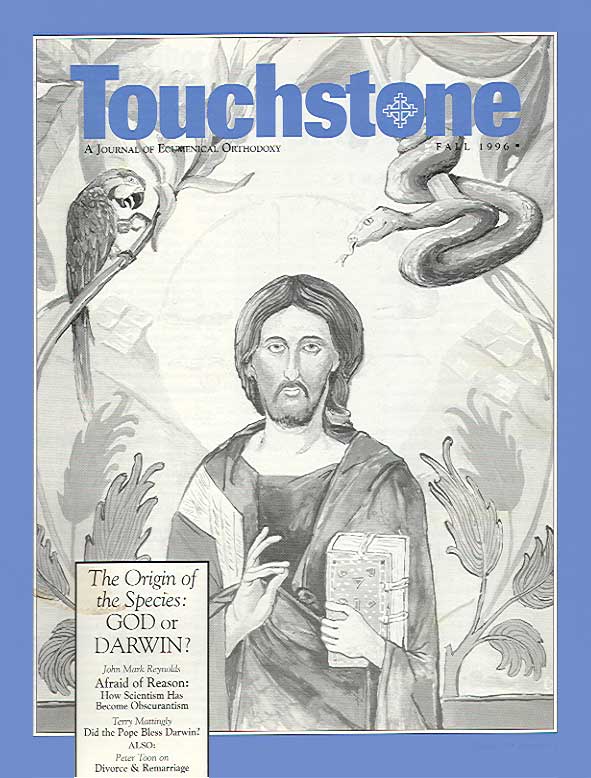Feature
A Sin Which Can Be Forgiven
Toward a Biblical Perspective on Divorce and Remarriage in the Churches
Today
In America few people seem to have reservations about expressing their opinions on so-called pro-life and pro-choice issues and questions. In contrast, many people seem to be hesitant to discuss openly and honestly whether divorce is right or wrong, and, if wrong, what can be done to reduce the number of divorces. In fact, while much is made of “family values” these days, there is a near silence over how the current divorce problem is related to these values.
Why this lack of discussion and debate? Probably because divorce is a public matter and many of us have either a brother or a sister (or a daughter or a son or a friend) who is divorced, and we do not want to appear to be condemning anyone who is divorced. Or, perhaps we do not want to be condemning ourselves.
Here is a starter for discussion among those who believe, teach and confess that marriage is ordained of God for the good of mankind and is not to be entered into unadvisedly or lightly, but reverently, discreetly, and soberly, in the fear of the Lord.
The Reality of Divorce
The man and the woman who enter into the covenant of marriage before God as Christians receive the blessing of the Holy Trinity upon their marriage as a “one flesh union.” Certainly, if they know their own hearts and are realistic, they expect that they will be guilty of various sins and will need to seek the forgiveness of God each day. However, there is one specific sin the Christian bride and bridegroom do not plan to commit: the sin of divorce. They have promised to be faithful to each other in good times and bad and until they are parted by death.
Divorce clearly is a sin because it is contrary to the Father’s will. The Lord Jesus Christ, the only-begotten Son of the Father, explained that in marriage a man and a woman leave their respective families to start a new family and “What God has joined together in marriage as one flesh let no man put asunder.” (Matthew 19:6) No Christian couple expects their marriage in Christ to be dissolved by sin.
In his holy love, however, God forgives sin. For the sake of his Son, our Lord Jesus Christ, who made atonement for the sins of the world, the Father forgives those who repent and look to him in faith, hope and love. Even the sin of divorce, though it is the tearing apart of what God has united, can be forgiven in those who are penitent and look to God for mercy.
For a divorced person to seek and receive the forgiveness of God is crucial, for by such repentance a gracious spirit can enter the heart so that he or she is able to continue to do his duty with a ready, if pained heart; but the acceptance of the grace of God does not change the basic problems caused by the divorce. Where there are children of the marriage, where there is property involved, and where ripples are sent out in a variety of directions, its effects last a long time.
Recently many Protestant churches have invested much time, skill, energy and money to help divorcees adjust to their new circumstances, especially to help them overcome feelings of guilt, failure and anger. These same churches, whose own clergy often are divorced and remarried, also have been very supportive by allowing divorcees to be married in church for a second and even third time.
However, while such compassion and care are commendable, there has been apparently little or no recognition that divorce is a sin, that it requires penitence before God and has to be forgiven by him in his Church. What often has been lacking is the godly exercise of penitence and discipline for the cure of souls.
The Roman Catholic Church, which still teaches that marriage is indissoluble, has faced the great increase in divorce in the United States among its 60-million members through a variety of marriage-saving and enriching programs and also through the granting of annulments. Thus many thousands of Roman Catholics, whose marriages are terminated by the courts of this country, then go through a process by which it is declared by the Church that their first marriage was not a true marriage because of this or that impediment, and an annulment is given. Then they are free to receive Holy Communion and to marry again.
The number of first marriages that end in divorce has steeply increased in recent years and now stands at about 50 percent. One million or so children each year watch their parents split up. (About the same number of infants are born out of wedlock.) Some results of this very high divorce rate are obvious—e.g., the increase in both one-parent families and in families made up of parts of two previous families (with the difficulties of relating to stepchildren and stepparents). Other results are less obvious but are nonetheless real—e.g., the increase in psychological problems for children and financial burdens upon men now obliged to contribute to the support of two families.
In these circumstances, should the churches tighten up their doctrine and discipline and gracefully but firmly stand against secularist culture? Or should they simply go with the trends of society concerning marriage and divorce, and, in compassion, seek to deal with their results?
The Early Church
Divorce was allowed in Judaism and by the Roman Empire. Thus the early Church had to seek to be faithful to Jesus Christ and his teaching on marriage in a society where divorce was permitted and acceptable. We may summarize the various teachings in the New Testament as follows:
1. God’s plan for marriage is that it is to be a permanent union. “What God has joined together let no man put asunder.” (Mark 10:2-9; Matthew 19:3-8)
2. Divorce followed by remarriage constitutes adultery. (Matthew 5:32b; Mark 10:11-12; Luke 16:18)
3. Married couples should neither separate nor divorce. (1 Corinthians 7:10)
4. In cases where there is a separation or a divorce, those involved must remain single and celibate or be reconciled to each other. (1 Corinthians 7:11)
5. Divorce, except in the case of unchastity [Greek, porneia] is a species of adultery and leads to further adultery. (Matthew 5:32b)
6. “Whoever divorces his wife, except for immorality [Greed, porneia}, and marries another, commits adultery.” (Matthew 19:9)
It appears that statements 5 and 6 (with the two “except” clauses) from Matthew’s Gospel are in conflict with statements 1 through 4. Numbers 5 and 6 seem to allow what is forbidden by 1 through 4. So it is not surprising that different traditions of interpretation of these verses have led to different doctrines of marriage and divorce among the various churches.
In Christian history the most obvious examples are, on the one hand, the Roman Catholic interpretation of 5 and 6 causing them wholly to agree with 1 through 4 so that the indissolubility of marriage is maintained, and, on the other hand, the sixteenth-century Protestant interpretation (following the exegesis of Erasmus) allowing the legitimacy of divorce where there has been adultery, (since adultery causes the end of the one-flesh union).
The evidence from the Fathers of the early Church is unanimous in its clear message that (a) divorce is a sin and that (b) those who are divorced ought not to remarry. The Fathers call for total and mutual faithfulness between the husband and wife for they take seriously the word of Jesus that the two persons become one flesh, and what God has joined no human being is to separate. This is not, of course, to say that divorce did not occur among church members and that some divorcees did not remarry—for divorce and remarriage were allowed by Roman law and were common in society.
Further, all the evidence we have from cannon law of the early church is that marriage was understood to be a permanent union and thus to break it was a serious sin. In fact all divorcees, whether guilty or innocent parties, were automatically excluded from Holy Communion until they did penance and were restored by the bishop—and those guilty of adultery were excluded from Holy Communion for a very long time. Even the “innocent parties” of divorces who remarried were placed under penitential discipline and prevented from receiving Holy Communion, sometimes for as long as the former spouse was still alive.
In other words, divorcees were treated somewhat as catechumens, who were allowed into the divine service and encouraged to worship and pray but not permitted to receive the Sacrament until the appointed length of their penitence was completed. Of course, each bishop had the authority to take action in each case that was pastorally right for the person(s) involved, yet penitential discipline of some kind was the norm in all cases.
The Greek Church in the East developed two forms of marriage service. First the real service, set in the Eucharist, for those marrying for the first time and the other, outside the Eucharist, for those who were marrying for the second or third time (whether as divorced or as widowed). However, while remarriage of laity was allowed but certainly not encouraged, no remarriage of a priest or deacon was permitted by the Orthodox Church under any circumstances. In this case the one-flesh doctrine was (and still is) strictly applied.
In the West, the Latin Church, following St. Augustine’s teaching, maintained the indissolubility of marriage and thus, while there could be separation and divorce for couples, there could be no blessing of a second marriage by the Church. Only if the first marriage could be shown not to have been a true marriage could there be a second (in essence, a first) marriage—thus the development of annulments, a procedure always open to abuse. Further, clergy have been required to be celibate.
In Modern America
It is exceedingly difficult for churches in America to maintain any moral discipline concerning divorce and remarriage. The influence of the secularist culture and the belief in individual rights—including the right to end a bad marriage and seek to make a good second one—are very much supportive of no-fault, easy-divorce and easy-to-arrange second marriages. Further, the competitive nature of the supermarket of religions means that if one church is stricter in morality than the competition, then it may not be as successful in its outreach and search for tithing members as the other church down the road.
Take, first of all, the evangelical Christianity that prospers in independent, congregational assemblies, and provides lively worship services with singing, praying and popular preaching. To try to exercise any discipline here would be virtually impossible. Take the “Lord’s Supper,” for example. This is no longer a weekly, central act of worship; and when it is observed it normally includes the invitation, “All who love the Lord are invited to partake.” How could anyone who wished to come be excluded from the Table?
Further, since the main thrust of evangelical religion is individualistic, that is for a person to have “a personal relationship with Jesus,” then, where this union with heaven is claimed, it matters little whether he is divorced or married once, twice or thrice, for it is held that this sinner is forgiven, and that he is right with God! In fact, his status before God is that it is as if he had never sinned because Jesus is his Savor. (His marital status could possibly be a question if he became a candidate for the ordained ministry.) Thus it is not surprising that the general emphasis in such churches is on making marriages work and helping those who are divorced. Little is gained in these circles by speaking of divorce as a sin. For one thing, it keeps away potential members.
Second, the situation is not much different in the mainline denominations such as the Episcopal, Lutheran and Presbyterian churches. All maintained some form of marital discipline to the middle of this century but have gradually allowed it to disappear or become ineffective. For example, the Episcopal Church only began to allow some divorced persons, who were given secular annulments of their first marriage, to be married in church from 1947. By 1996, despite whatever rules remain on paper, there are virtually no restrictions in most dioceses on who may be married in church, and it is rare to hear anyone speak of divorce as a sin. Further, about one quarter of the Episcopal clergy, who actually officiate at services of marriage, are themselves divorced.
So in the old Protestant denominations, as with the conservative evangelical churches, divorce is accepted as a reality of modern life, and the emphasis is placed on efforts to help those who go through this painful experience. Further, within the modern, liberal examples on being “inclusive” of all people whatever their life-style, being divorced is seen as a sometimes necessary if painful fact of life that many of us have to face.
One very important result of a significant number of divorced and remarried persons in a church’s membership, whether in an evangelical or liberal congregation, is a reducing of the church’s ability to adopt and commend with courage a full biblical morality. Divorcees (and their friends and families) are grateful to an institution that has welcomed them and thus they do not wish to rock the boat by challenging the decisions of denominational leadership or the moral status of others. Further, the pastors do not want to embarrass in any way the twenty percent or so of the membership that is divorced and so cannot push them beyond a certain point.
Third, at first glance the situation is very different in the Roman Catholic Church. Marriage is declared to be indissoluble and thus, while separation and divorce are recognized as legal realities, divorcees are denied the Sacrament and no divorced person can be remarried in church. But in what appears to be a massive accommodation to modern reality, annulments are granted by the thousands each year (circa 60,000 in 1994) to those who have been divorced in secular courts so that they can be communicant members in good standing, becoming, as it were, as those who have never been married. With an annulment remarriage is then possible, again with the agreement if not the blessing of the hierarchy.
Fourth, it therefore appears that the rise in the divorce rate will not be significantly slowed down through the current work and witness of the churches in America. To say this is not in any way to downplay or disregard the work being done by concerned clergy and laity and by such organizations as Focus on the Family, the Marriage Savers Institute of Mike McManus, the Cursillo movement, the American Family Association, the Family Research Council and a variety of Roman Catholic societies. Rather, it is to face the haunting possibility that under the severe pressure of modern conditions and with the exception of a life span of eighty or so years, the ideal of one man and one woman united in marriage for 50 or so years is out of reach of ordinary mortals and is a goal only for the elect.
A Goal for the Elect
For Christians who take the sacred Scriptures seriously, witnessing to the Word of God Incarnate, our Lord Jesus Christ, marriage must be accepted according to the divine will. There is no alternative, whatever the difficulties.
It is clearly stated in Genesis 2:24 and repeated by Jesus himself that “for this reason a man shall leave his father and mother and shall be joined to his wife, and the two shall become one flesh. So they are no longer two but one flesh.” And to this Jesus added, “What therefore God has joined together let no man put asunder.” Then also the Apostle Paul, citing the words of Genesis 2:24, presents the one-flesh union of husband and wife as a picture of the everlasting union of Christ, the Bridegroom and his Bride, the Church. (Ephesians 5:29ff.)
With this ideal, which also is a command, Christians know for what they are to aim as they call upon the Lord to assist them while they seek to glorify his name. To begin to achieve the ideal and obey the Lord, the following general agenda will surely need to be in place:
1. A thorough knowledge by the leadership of the church of the teaching of Scripture concerning marriage and how it has been interpreted both in the early Church and in the central traditions (including the texts of marriage services) of the Church. Probably we have most to learn from the early Church, of the East.
2. Pastors who are either celibate or are the husbands of one wife (see 1 Timothy 3:2). The reform and renewal of the household of God must begin somewhere and why not with the pastors? Those pastors who are divorced and remarried could stand down or pursue specialist ministries that did not involve normal parochial relations and responsibilities.
3. Careful preparation for those to be married, including serious discussion of the purpose of marriage and the duty of procreation. This to be followed by appropriate support of the couples after their wedding, normally by older couples who have a happy marriage.
4. A provision not only of counseling but also of penitential discipline for those divorced and those who remarry after divorce. The serious nature of breaking the one-flesh union must not only be recognized and taught but also treated as a severe disease of the soul that has to be purified through appropriate discipline, especially exclusion from the Lord’s Table. To do this in modern America will of course require the cooperation of the divorced person, who submits to the chastisement of the Lord.
5. Careful and constant teaching from the Word of God to the congregation concerning God’s will for the ordering of human life on earth in stable and godly families. This should be done in such a way as not to make those whom the Lord has called to celibacy feel like second-class Christians.
6. Providing a careful and reasoned apology to the American people for stable marriages, supported by a bias in taxation, and difficult, but not impossible, divorce in the court system. Today two people living together but not married have an economic advantage, and with no-fault divorce on the books it is too easy to walk out of marriage.
The Reverend Dr. Peter Toon, a contributing editor, is the President of the Prayer Book Society of the Episcopal Church and acting rector of Christ Church, Danville, Virginia. He has recently published two books on major dogmas—Our Triune God: a Biblical Portrayal of the Holy Trinity (Wheaton, IL: Victor Books) and Yesterday, Today and Forever: Jesus Christ and the Holy Trinity in the Decrees of the Seven Ecumenical Councils (Swedesboro, NJ: Preservation Press). He invites comments on the theme of this essay. Write to him at P.B.S., P.O. Box 35220, Philadelphia, PA 19128, or phone 1-800-PBS-1928.
subscription options
Order
Print/Online Subscription
Get six issues (one year) of Touchstone PLUS full online access including pdf downloads for only $39.95. That's only $3.34 per month!
Order
Online Only
Subscription
Get a one-year full-access subscription to the Touchstone online archives for only $19.95. That's only $1.66 per month!
bulk subscriptions
Order Touchstone subscriptions in bulk and save $10 per sub! Each subscription includes 6 issues of Touchstone plus full online access to touchstonemag.com—including archives, videos, and pdf downloads of recent issues for only $29.95 each! Great for churches or study groups.
Transactions will be processed on a secure server.
more on marriage from the online archives
more from the online archives
calling all readers
Please Donate
"There are magazines worth reading but few worth saving . . . Touchstone is just such a magazine."
—Alice von Hildebrand"Here we do not concede one square millimeter of territory to falsehood, folly, contemporary sentimentality, or fashion. We speak the truth, and let God be our judge. . . . Touchstone is the one committedly Christian conservative journal."
Support Touchstone
—Anthony Esolen, Touchstone senior editor












